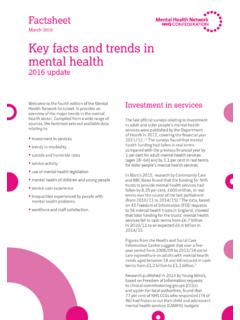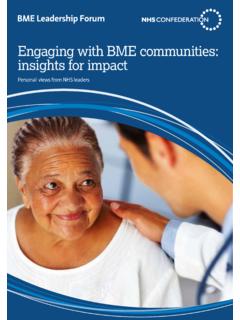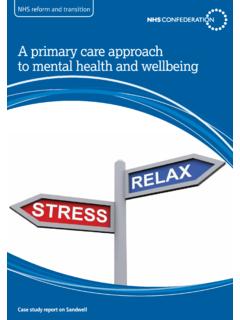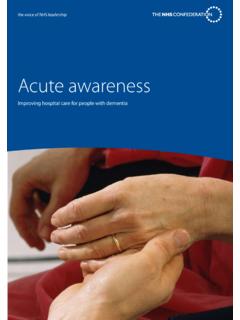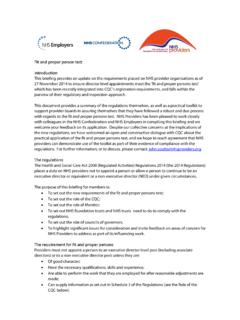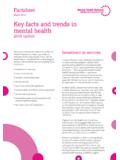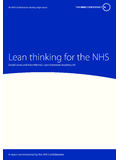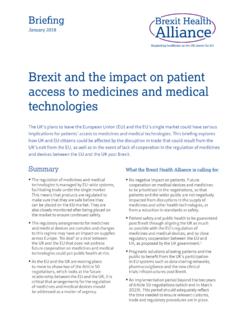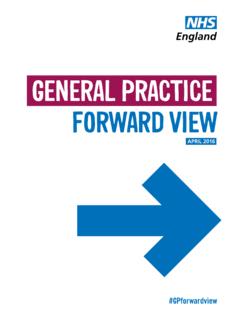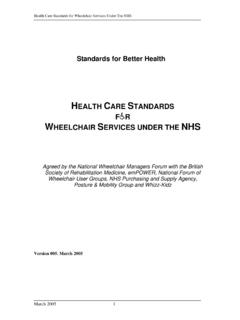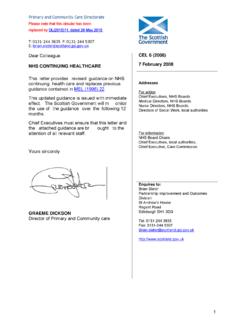Transcription of Refreshing NHS plans for 2018/19: Key points - …
1 The voice of NHS leadership Refreshing NHS plans for 2018 /19: Key points In 2016, NHS England and NHS Improvement set out planning guidance, including contracts and improvement priorities, for the period from 2017 to 2019. Refreshing NHS plans for 2018 /19, published on 2 February 2018 , reflects on the changes that have been made in the period since. It provides updated guidance on how commissioners and providers should refresh their plans for 2018 /19. The guidance is intended to allow organisations to continue working together through STPs to deliver system-wide plans , with additional freedoms and flexibilities offered to the most advanced systems. This briefing draws out the key points from the 31-page document. You can also view the NHS Confederation s media statement and responses from the Mental Health Network and NHS Clinical Commissioners. Financial framework for commissioners Resources available to CCGs will be increased by billion, reflecting realistic levels of emergency activity, additional elective activity to tackle waiting lists, universal adherence to the Mental Health Investment Standard and a commitment to reaching standards set for cancer services and primary care.
2 Additional investment will be made through: - removing the requirement for CCGs to underspend per cent of their allocations for 2018 /19, releasing 370 million, and removal of the requirement for a further per cent to be spent non-recurrently - an additional 600 million for CCG allocations in 2018 /19, distributed in proportion to target allocations - creation of a new 400 million Commissioner Sustainability Fund to enable CCGs to return to in-year financial balance. Where a CCG is unable to operate within its allocation it must commit to a credible plan to deliver a deficit control total. It will then qualify to access the Commissioner Sustainability Fund. Financial framework for providers A further 650 million will be added to the Sustainability and Transformation Fund, to create a billion Provider Sustainability Fund. This additional investment will be reflected in 2018 /19 provider control totals.
3 30 per cent of the fund will be linked to A&E performance. Providers will plan on the basis of their 2018 /19 control totals. Providers who accept their control totals will continue to be exempt from the application of certain agreed performance sanctions. NHS England will be consulting on changes to the Standard Contract to extend this exemption to all national performance sanctions, except mixed-sex accommodation, cancelled operations, healthcare associated infections and duty of candour. This will be done on the basis that NHS Improvement will continue to ensure performance at acceptable levels against all national standards. Capital and estates The government has commited to providing an additional 354 million capital for property and estates investment. Allocations for this funding have not yet been confirmed, so STPs and providers should not plan on the basis of receiving this additional funding.
4 STP capital will be contingent on the areas having an estates and capital plan that sets out how individual organisations will work together to deploy the funding to support integrated service models, share assets and dispose or un- or under-used estate. National tariff The two-year tariff remains in place for next year. Underlying assumptions Local systems are expected to continue to implement the priority efficiency programmes within the ten-point efficiency plan . CCGs will receive the remaining period of temporary benefit from changes made to Category M generic drug prices. CCGs should consider how to locally implement guidance on the 18 ineffective and low clinical value medicines. CCGs will continue to work with the NHS England Continuing Healthcare and QIPP programmes. Specialised commissioning The contracting approach continues into 2018 /19, aligned to the implementation of the Carter review.
5 Emergency care Clarity on control totals, as well as additional sustainability funding for providers and commissioners, are intended to enable health systems to plan for activity in a way that enables improved A&E performance. Allocations also allow for a per cent growth in non-elective admissions and a per cent growth in A&E attendances. It is expected that government will roll forward the goal of ensuring aggregate performance against the four-hour target of 90 per cent for September 2018 , with the majority of providers achieving 95 per cent for March 2019 and a return to overall adherence to the 95 per cent standard during 2019. plans should demonstrate how commissioners and providers will complete the implementation of the integrated urgent care strategy. All providers and commissioners should work together to reduce length of stay. Community providers will be invited to participate in a new local incentive scheme where savings from acute excess bed day costs can be reinvested to expand community and intermediate care.
6 210 million CCG Quality Premium incentive funding will be contingent on performance on moderating demand for emergency care. Referral to treatment times Allocations now allow for improvements in the volume of elective surgery and improvements in waits over 52 weeks. Commissioners and providers are asked to plan on the basis that their RTT waiting list will be no higher in March 2019 than March 2018 , and should aim to reduce it. National numbers of patients waiting over 52 weeks should be halved by March 2019. Provider plans will need to consider the capacity required to deliver growth in elective and non-elective activity. Integrated system working All STPs are expected to take an increasingly prominent role in planning and managing system-wide improvement efforts. This should include: ensuring a system-wide approach to operating plans ; implementing service improvements that require system-wide effort; identifying system-wide efficiency opportunities; undertaking a system-wide review of estates; and further steps to enhance the capability of the system including stronger governance and aligned decision making and greater engagement with communities and partners.
7 There will be a further, non-recurrent, allocation within each STP to support its leadership. Integrated care systems (previously known as accountable care systems) will continue to be rolled out voluntarily. The existing ICS areas should prepare a single system operating plan narrative, rather than individual organisational narratives, and NHS England and NHS Improvement will focus their assurance on these system plans , not organisational ones. All ICSs will work within a system control total, with flexibility to vary individual control totals. They are encouraged to adopt a fully system-based approach to the PSF and CSF. All ICSs will be required to operate under system control total incentive structures by 2019/20, but there will be some flexibility on this in 2018 /19. Systems adopting this structure will have a more autonomous regulatory relationship with NHS England and NHSI.
8 STPs that wish to join the ICS programme should confirm expressions of interest with their regional team. NHS England will aim for applications to be reviewed by March 2018 . All systems are expected to engage with patients, the public, their democratic representatives and other community partners. Process and timetable Commissioners and providers should update the 2018 /19 year of their existing two-year plans to take accoutns of these changes. Where changes need to be reflected in finance, activity or other schedules, a contract variation should be agreed and signed no later than 23 March 2018 . CQUIN and Quality Premium NHS England will shortly publish an update to the 2017/19 CQUIN guidance. Winter demand and capacity There will be no additional winter funding in 2018 /19. Systems will need to demonstrate that winter plans are embedded in both system and individual organisation operating plans .
9 There is a requirement for each system to produce a separate winter demand and capacity plan . Guidance for these plans will be available by March 2018 .
